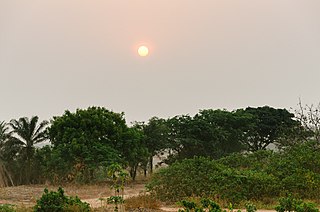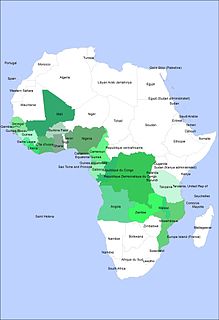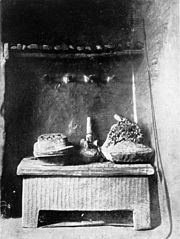
Ọdinani, also Omenala, Omenana, Odinana or Ọmenani, are the traditional cultural beliefs and practices of the Igbo people of south east Nigeria. These terms, as used here in the Igbo language, are synonymous with the traditional Igbo "religious system" which was not considered separate from the social norms of ancient or traditional Igbo societies. Theocratic in nature, spirituality played a huge role in their everyday lives. Although it has largely been supplanted by Christianity, the indigenous belief system remains in strong effect among the rural and village populations of the Igbo, where it has at times influenced the colonial religions. Odinani is a pantheistic and polytheistic faith, having a strong central deity at its head. All things spring from this deity. Although a pantheon of other gods and spirits, these being Ala, Amadiọha, Anyanwụ, Ekwensu, Ikenga, exists in the belief system, as it does in many other Traditional African religions, the lesser deities prevalent in Odinani expressly serve as helpers or elements of Chukwu, the central deity.

The Igbo people are an ethnic group in Nigeria. They are primarily found in Abia, Anambra, Ebonyi, Enugu, and Imo States. A sizable Igbo population is also found in Delta and Rivers States. Large ethnic Igbo populations are found in Cameroon, Gabon, and Equatorial Guinea, as well as outside Africa. There has been much speculation about the origins of the Igbo people, which are largely unknown. Geographically, the Igbo homeland is divided into two unequal sections by the Niger River—an eastern and a western section. The Igbo people are one of the largest ethnic groups in Africa.

African art describes the modern and historical paintings, sculptures, installations, and other visual culture from native or indigenous Africans and the African continent. The definition may also include the art of the African diasporas, such as: African American, Caribbean or art in South American societies inspired by African traditions. Despite this diversity, there are unifying artistic themes present when considering the totality of the visual culture from the continent of Africa.

Egungun, in the broadest sense is any Yoruba masquerade or masked, costumed figure. More specifically, it is a Yoruba masquerade for ancestor reverence, or the ancestors themselves as a collective force. Eégún is the reduced form of the word egúngún and has the same meaning. [Rowlands, E.C. (1973-01-01). "Yoruba (Teach Yourself Books", chapter 7, page 39] There is a misconception that Egun or Eegun is the singular form, or that it represents the ancestors while egúngún is the masquerade or the plural form. This misconception is common in the Americas by Orisa devotees that do not speak Yorùbá language as a vernacular. "Egungun is a visible manifestation of the spirits of departed ancestors who periodically revisit the human community for remembrance, celebration, and blessings."

Enugu is the capital of Enugu State in Nigeria. It is located in southeastern Nigeria. The city had a population of 820,000 according to the 2022 Nigerian census. The name Enugu is derived from the two Igbo words Énú Ụ́gwụ́, meaning "hill top", denoting the city's hilly geography.
Arondizuogu (Aro-ndizuogu) is a town inhabited by the Igbo subgroup, the Aro people in the Imo State of Nigeria. The Arondizuogu community is believed to have migrated from Arochukwu in the present Abia State, to their current settlements in across three local governments of Imo state, which include the Okigwe, Ideato North and Onuimo Local Governments, although there are others of Aro descent in other local governments, in Imo State.

Igboland, also known as Southeastern Nigeria, is the indigenous homeland of the Igbo people. It is a cultural and common linguistic region in southern Nigeria. Geographically, it is divided by the lower Niger River into two sections: an eastern and a western one. Its population is characterised by the diverse Igbo culture and the speakers of equally diverse Igbo languages.
The Northern Edo Masquerades are a traditional ceremony practiced by the Edo people of Nigeria.

Traditional African masks play an important role in certain traditional African rituals and ceremonies.
Umunoha is a town in southeastern Nigeria near the city of Owerri. It is a typical Igbo town. It is bounded on the north by Eziama Obiato and Afara communities; on the south and southwest by Ogbaku, Azara Obiato and Ejemekwuru communities; and on the south and southeast by Ifakala and Afara communities. It is served by the great east-west road, the Port-Harcourt-Lagos Highway. Umunoha is about thirteen kilometers from Owerri, the Imo State capital. It is a small, compact but thickly populated community with a projected 1997 population of twenty-five thousand people.
Ozalla is a prominent town in Nkanu West Local Government Area of Enugu State, Nigeria.

Igbo art is any piece of visual art originating from the Igbo people. The Igbo produce a wide variety of art including traditional figures, masks, artifacts and textiles, plus works in metals such as bronze. Artworks from the Igbo have been found from as early as 9th century with the bronze artifacts found at Igbo Ukwu. With processes of colonialism and the opening of Nigeria to Western influences, the vocabulary of fine art and art history came to interact with established traditions. Therefore, the term can also refer to contemporary works of art produced in response to global demands and interactions.
The Songye people, sometimes written Songe, are a Bantu ethnic group from the central Democratic Republic of the Congo. They inhabit a vast territory between the Sankuru and Lubilash rivers in the west and the Lualaba River in the east. Many Songye villages can be found in present-day East Kasai province, parts of Katanga and Kivu Province. The people of Songye are divided into thirty-four conglomerate societies; each society is led by a single chief with a Judiciary Council of elders and nobles (bilolo). Smaller kingdoms east of the Lomami River refer to themselves as Songye, other kingdoms in the west, refer to themselves as Kalebwe, Eki, Ilande, Bala, Chofwe, Sanga and Tempa. As a society, the people of Songye are mainly known as a farming community; they do, however, take part in hunting and trading with other neighboring communities.
Igbo Culture are the customs, practices and traditions of the Igbo people of southeastern Nigeria. It consists of ancient practices as well as new concepts added into the Igbo culture either by cultural evolution or by outside influence. These customs and traditions include the Igbo people's visual art, music and dance forms, as well as their attire, cuisine and language dialects. Because of their various subgroups, the variety of their culture is heightened further.
The Igbo calendar is the traditional calendar system of the Igbo people from present-day Nigeria. The calendar has 13 months in a year (afo), 7 weeks in a month (onwa), and 4 days of Igbo market days in a week (izu) plus an extra day at the end of the year, in the last month. The name of these months was reported by Onwuejeogwu (1981).

The Nze na Ozo society, is the highest and most important spiritual religious and social grouping in the Igbo society of Southeast Nigeria. Initiation into the aristocratic Nze na Ozo society marks the person as nobility. To become Ozo implies that the title holder is now an ‘Nze’ implying living spirit and an ancestor. One then becomes the moral conscience of the community and is seen to be a fair adjudicator in cases of disputes within the community. In times of crisis, most Igbo communities will rely on Ozo members for leadership. Generally, in most Igbo communities, only holders of Ichi title may become candidates for Ozo title. Anthropologists have seen cases of women with Ichi scarification, although only men are amongst the Ozo, a title which accords the individual extreme prestige, power, and influence in the community.

Masks are the most important art form of the Dan people of Liberia. The Dan people refer to these masks as gle or ge, terms that refers both to the physical mask and the individual spirits the mask is believed to embody during masquerade performances.

Ijele Masquerade, known as the biggest Masquerade in Sub-Saharan Africa, is a tradition of the Igbo people of Nigeria and was listed in the UNESCO Archives as an intangible cultural element in need of urgent safeguarding. In many communities in the state of Anambra in South-Eastern Nigeria, celebrations, burial ceremonies and other special occasions during the dry season to evoke fertility and a bountiful harvest feature the performance of the Ijele masquerade.
The ofo is a staff carried by selected Igbo leaders — notably patrilineage priests, kings, onyishi, and some masqueraders — that signifies authority, the right to command, administrative powers, and/or the conferment of leadership and power bestowed by the gods..It is typically six to seven inches long and made of bronze, brass, or wood.


![]() listen ) is a traditional masquerade of the Igbo people of Southeastern Nigeria. They are performed only by males in exclusive secret societies and involve the use of elaborate, colorful costumes that are meant to invoke ancestral spirits. [1] Masquerade traditions have a varied range of purposes that span from performing elements of epic drama derived from community cosmology and lore, ushering in new months and seasons, honoring totems and ancestral spirits, enactments of parables or myths, with entertainment and community building serving as a consistent commonality. In the past masquerades also bore judicial, social regulatory, and even policing powers, however though these functions have decreased in modern times.
listen ) is a traditional masquerade of the Igbo people of Southeastern Nigeria. They are performed only by males in exclusive secret societies and involve the use of elaborate, colorful costumes that are meant to invoke ancestral spirits. [1] Masquerade traditions have a varied range of purposes that span from performing elements of epic drama derived from community cosmology and lore, ushering in new months and seasons, honoring totems and ancestral spirits, enactments of parables or myths, with entertainment and community building serving as a consistent commonality. In the past masquerades also bore judicial, social regulatory, and even policing powers, however though these functions have decreased in modern times.









